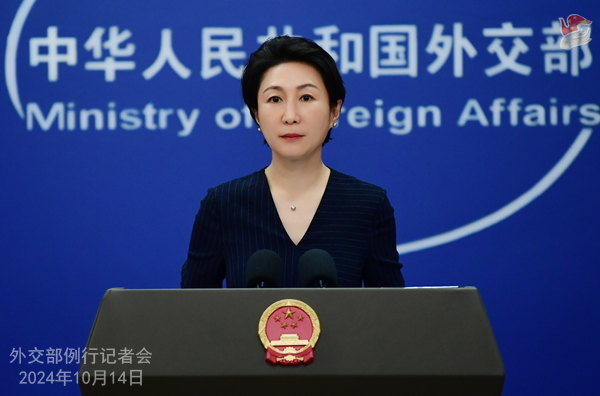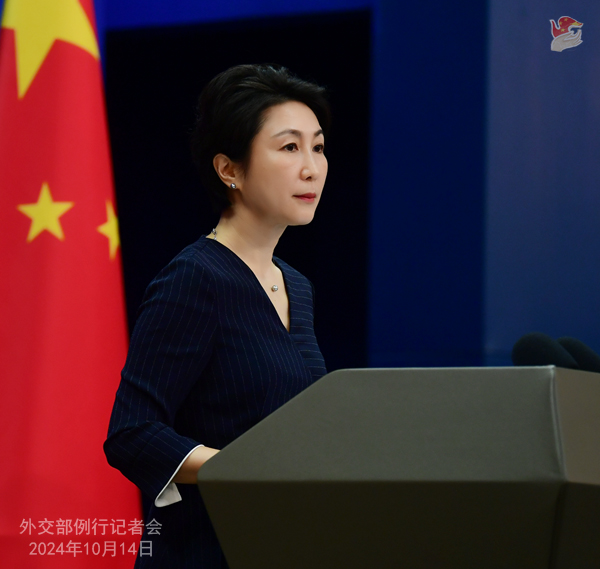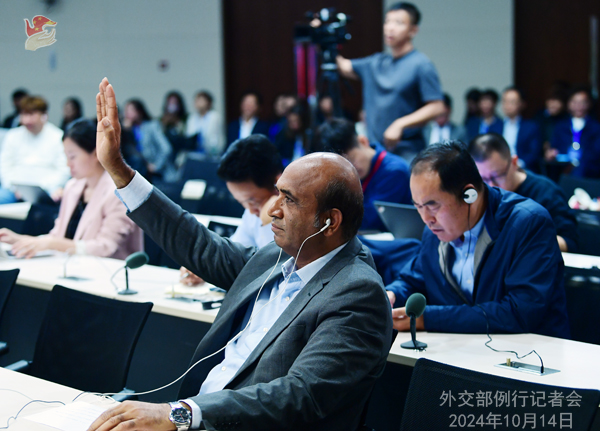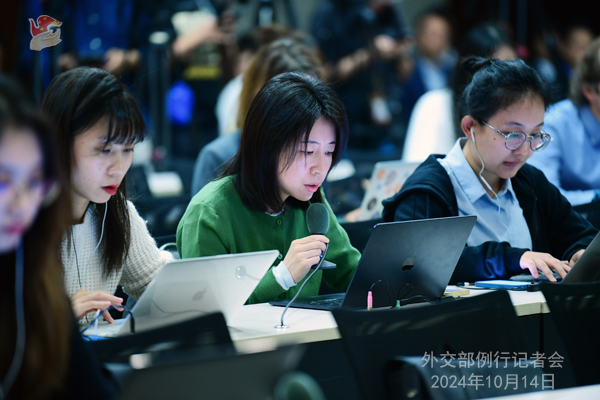
CCTV: China announced Premier Li Qiang will attend the 23rd Meeting of the Council of Heads of Government of Member States of the Shanghai Cooperation Organization. What’s China’s expectation of the SCO meeting?
Mao Ning: Since the founding of Shanghai Cooperation Organization 23 years ago, SCO member states have all along upheld the Shanghai Spirit, ridden on the trend of the times, enhanced good-neighborliness and friendship, deepened cooperation in various fields, and greatly contributed to the security and stability of the Eurasian continent and the development and prosperity of countries in the region. As changes unseen in a century unfold at a faster pace in our world, the international community hopes the organization will shoulder greater responsibility and achieve greater progress in practical cooperation.
When attending the SCO summit in Astana this July, President Xi Jinping put forward the important initiative of building a common home of solidarity and mutual trust, peace and tranquility, prosperity and development, good-neighborliness and friendship, and fairness and justice. President Xi Jinping reached important consensus with leaders of the SCO member states on advocating solidarity and cooperation, upholding international fairness and justice, and improving SCO operation mechanisms, and set the course for SCO’s development under the new circumstances. After the Astana summit, China took the rotating presidency of SCO and will host the summit next year. At this meeting of the Council of Heads of Government, Premier Li Qiang will have an in-depth exchange of view with leaders of the participating countries on implementing the consensus reached at the Astana summit and advancing SCO’s practical cooperation. China believes that this meeting will produce positive outcomes and give a stronger boost to the security, stability and development of regional countries.
Yonhap News Agency: The ROK government nominated former presidential chief of staff Kim Dae-ki as the new ambassador to China. What impact will the rotation have on ROK-China high-level exchanges including leaders’ exchanges? The post of Chinese Ambassador to the ROK has been vacant for over three months. When will Beijing appoint a new ambassador?
Mao Ning: Ambassadors act as bridges for the growth of relations between countries. We stand ready to maintain communication with the ROK on the nomination of new ambassador to promote the sound and steady growth of China-ROK relations.
On the appointment of Chinese ambassador to the ROK, I have no information to share with you. You may follow the Foreign Ministry’s website for any update.
AFP: China has announced that it is conducting military drills in the waters around Taiwan. Could the Foreign Ministry give us more information on the specific goal and content of the drills? Could you please tell us when the drills will end? How does the Ministry respond to those voices claiming that China is undermining regional peace and stability?
Mao Ning: What you asked about is not related to China’s foreign affairs and I’d refer you to competent authorities. What I can tell you is that “Taiwan independence” is as incompatible with cross-Strait peace as fire with water, and provocations by “Taiwan independence” forces will be responded with countermeasures. China has always been committed to maintaining regional peace and stability, to which countries in this region bear witness. For anyone who cares about peace and stability across the Taiwan Strait, they need to stand against “Taiwan independence” first and foremost.

NHK: The Spokesperson of the US Department of State expressed serious concerns over the military drills. What’s your comment on that?
Mao Ning: Taiwan is part of China, and the Taiwan question is China’s internal affair that brooks no external interference. If the US truly cares about peace and stability in the Taiwan Strait and regional prosperity, it needs to abide by the one-China principle and the three China-US joint communiqués, act on its leaders’ commitment of not supporting “Taiwan independence,” stop arming Taiwan,and stop sending any wrong signal to the “Taiwan independence” separatist forces.
The Paper: From October 11 to 14, Premier Li Qiang paid an official visit to Laos and Viet Nam. Could you share with us the details and major outcomes of the visit?
Mao Ning: Laos and Viet Nam are China’s socialist friends and neighbors. This is Premier Li Qiang’s first visit to the two countries after he took office, which produced fruitful results.
First, demonstrating the strategic importance of building the community with a shared future. The Lao side stressed that the Lao party, government and people have, as always, viewed China as their close and good neighbor, friend, comrade and partner. The Vietnamese side highlighted that the Vietnamese party and government have, as always, viewed its relations with China as the strategic choice and top priority in its foreign policy. China shared the view with Laos and Viet Nam that their respective development offers opportunities to the other country’s development and is a positive factor in regional and global development. We agreed to continue approaching the bilateral relations from a strategic height and long-term perspective, firmly support each other in advancing the cause of socialism and exploring modernization with respective characteristics, deliver on the important common understandings between the top leaders of our parties and countries, and achieve more practical progress in building a community with a shared future.
Second, reaffirming the principled position on major issues. Both Laos and Viet Nam reaffirmed their firm commitment to the one-China principle, their firm opposition to “Taiwan independence” separatist activities in any form, and their firm support for the Global Development Initiative, the Global Security Initiative and the Global Civilization Initiative. The three sides believed it’s important to oppose bloc confrontation, power politics, and unilateralism in any form, and agreed to step up coordination and collaboration in multilateral mechanisms, actively conduct cooperation under the above-mentioned three initiatives, and advocate an equal and orderly multipolar world and a universally beneficial and inclusive economic globalization.
Third, agreeing to deepen comprehensive strategic cooperation. China and Laos will continue advancing the synergy between Belt and Road Initiative and Laos’ strategy of transition from a land-locked to a land-linked country, expanding practical cooperation in various areas, such as trade, investment, industrial capacity, electricity and minerals, speeding up the development along the China-Laos Railway and the implementation of “juxtaposed border control,” and delivering more tangible progress in China-Laos cooperation across the board. China and Viet Nam will enhance the synergy of development strategies, strengthen the “physical connectivity” of railway, highway and port infrastructure, and the “institutional connectivity” such as smart customs, and provide stronger underpinning to boost trade and investment facilitation and keep supply chains stable and unimpeded. We actively look into building pilot cross-border economic cooperation zones and expand cooperation in emerging areas, including information technology, new energy, digital economy and important minerals. Both China and Viet Nam will host events in celebration of the 75th anniversary of the establishment of bilateral diplomatic relations and the China-Viet Nam Year of People-to-People Exchanges in 2025.
TV Asahi: This year’s Nobel Peace Prize was awarded last Friday to Nihon Hidankyo, a Japanese organization of survivors of atomic bombings. What’s China’s comment?
Mao Ning: I noted relevant reports. China always believes that the complete prohibition and thorough destruction of nuclear weapons for a world free of nuclear weapons is in the interest of all humanity.
TV Asahi: We saw few reports about the Nobel Peace Prize from Chinese mainstream media outlets. But they wrote reports on other awards. What’s the reason?
Mao Ning: I am not aware of what you mentioned. The Chinese media choose for themselves what to report.

Associated Press of Pakistan: Yesterday, China announced Premier Li Qiang’s official visit to Pakistan. How does China view its current relations with Pakistan and how is China’s expectation for the visit?
Mao Ning: China and Pakistan are ironclad friends and all-weather strategic cooperative partners. Our relations have stood the test of time and remain rock-solid. This June, Pakistani Prime Minister Muhammad Shehbaz Sharif paid an official visit to China. The two sides actively delivered on the important common understandings reached by the leaders of the two countries, and bilateral relations have maintained sound momentum of development.
This is Premier Li Qiang’s first visit to Pakistan after he took office and marks an exchange of visits at the head-of-government level between the two countries within a year, which is of significance to deepening all-weather strategic cooperative partnership.
Through this visit, China looks to working with Pakistan to enhance the traditional friendship, strengthen strategic communication, build the China-Pakistan Economic Corridor in a high quality way, deepen and expand cooperation across the board, ensure the safety and security of Chinese personnel, projects and institutions in Pakistan, accelerate the building of a closer China-Pakistan community with a shared future in the new era, and jointly safeguard regional peace, stability and prosperity.
Global Times: We noted China’s National Computer Virus Emergency Response Center, National Engineering Laboratory for Computer Virus Prevention Technology and the 360 Digital Security Group jointly released a report. It revealed that the US has been creating hypes about the group named “Volt Typhoon” and blames others to cover up cyberattacks it has launched. What’s China’s comment?
Mao Ning: I also noted the report. Relevant institutions have released two reports before revealing that “Volt Typhoon” is in fact an international ransomware group and that in order to receive more congressional budgets and government contracts, the US intelligence community and cybersecurity companies have been collaborating to spread disinformation and framing China. The latest report further exposed some staggering facts.
First, the US utilized advanced technical methods to frame other countries for launching cyberattacks. It inserted strings in other languages, such as Chinese, to mislead traceability attribution analysis and frame other countries. It is noteworthy that Guam, the place that the US claimed to be the victim of “Volt Typhoon” cyberattacks, is actually the initiator of a large number of cyberattacks against China and many Southeast Asian countries.
Second, the US is using its advantages concerning submarine optical fiber to launch massive, systemic cyber surveillance and espionage globally. Ironically, the US rallied some of its allies to issue a joint statement on the occasion of this year’s United National General Assembly claiming to safeguard the security and resilience of undersea cables.
Third, the US has never stopped wiretapping its allies, including Germany. In 2022, the US and Europe have established a new “US-EU Trans-Atlantic Data Privacy Framework,” and the United States promised to give more supervision of cyber surveillance operation in Europe for tricking Europe into agreeing to transmit data to the United States. The US used the Foreign Intelligence Surveillance Act to compel major US internet companies to provide access to user data from their servers, and launched indiscriminate surveillance program and data theft against internet users from Germany and other places in the world.
Fourth, some US tech firms have gradually become accomplices of the US government. The US on the one hand smears that other countries have made pre-positions to launch cyberattacks, yet on the other pre-positions access points into Internet products with the help of large Internet companies or equipment suppliers to attack supply chains worldwide. Some tech firms in order to get more interests actively involved themselves in spreading the false narrative about so-called Chinese hacking operations.
The facts revealed in the report once again show who is the biggest threat to global cyberspace security. So far, the US government not only turned a blind eye to the report, but also continued to spread disinformation including “Volt Typhoon.”
China condemns such irresponsible moves by the US, and urges the US to immediately stop its cyberattacks globally and stop smearing China by using cybersecurity issues.
